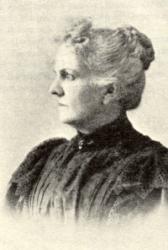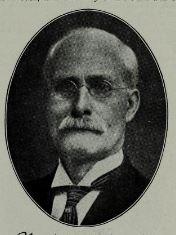1827 - 1907 Person Name: S. M. Grannis Hymnal Number: 266 Composer of "[If you cannot on the ocean]" in Favorite Solos Born: September 23, 1827, Geneseo, New York.
Died: 1907, Los Angeles, California.
Buried: Angelus Rosedale Cemetery, Los Angeles, California.
Grannis’ family moved to Le Roy, New York in 1831. His father Samuel owned a hardware business which in 1844 was located in the Barrett Block, known as the "Dock," on the present site of the Le Roy Post Office. Samuel was involved on the Underground Railroad. Sidney would drop into Samuel’s Store where he would sit down at the melodeon and sing until the room filled with people.
Although it was said that he never learned to read music, he wrote music to several poems. Grannis established a reputation with "Do They Miss Me at Home?" Caroline Mason wrote the poem "Do They Miss Me at Home?" and Sidney Grannis put it to music. It became a popular favorite during the Civil War. One of the lines reads: “Does someone repeat my name over and sigh that I tarry so long? And is there a chord in the music "That’s miss’d when my voice is away, And a chord in each heart that awaketh, regret at my wearisome stay?" He also composed the ballads, "Only Waiting," "Cling to the Union," and "People Will Talk You Know."
In 1856 Grannis wrote the words and music for Sparking Sunday Night. Sheet music was published by Joseph P. Shaw, Rochester, New York, affiliated with Oliver Ditson (Boston), who also distributed the song. The sheet music is preserved in the Sibley Library, Eastman School of Music, University of Rochester, New York.
As a solo singer, Grannis had a remarkable tenor voice, and it was said that his voice "was of marvelous flexibility, sweet as a flute, and had a range of three octaves." A newspaper in Pultneyville mentioned that Grannis performed at the Union Church in 1864 "to an appreciative audience." He sang at more than five thousand concerts. He organized the Amphion Troupe, a vocal quartet which included "Pixley and Bryant" and Emily Goodenou, who sang solo. The group toured the country giving concerts.
In 1864, Grannis was in New Haven, Connecticut, where he composed his music for Your Mission. In the later days of the Civil War, Philip Phillips, who had a wonderfully sweet tenor voice, was invited to sing at a great meeting of the United States Christian Commission in the Senate Chamber at Washington, February, 1865, President Lincoln and Secretary Seward (then president of the commission) were there, and the hall was crowded with leading statesmen, army generals, and friends of the Union. The song selected by Mr. Phillips was Mrs. Gates’ "Your Mission." The hushed audience listened spell-bound as the sweet singer went on, their interest growing to feverish eagerness until the climax was reached in the fifth stanza. In the storm of enthusiasm that followed, President Lincoln handed a hastily scribbled line on a bit of paper to Chairman Seward, "Near the close let us have Your Mission repeated."
In 1884, Grannis moved to Los Angeles, California, where several of his admirers presented him a cottage and grounds. It was said of him: "He was the best man we ever knew, going in and out among us like a ray of light, never complaining, always cheerful, always happy, never a cloud on his sunny countenance. His nature was musical, he loved to sing. His songs were inspiring, his mirth contagious. Who that has heard his favorite laughing song, can forget his sunlit face, or fail to recall the effect the song produced? His invitation "please join the chorus" was superfluous. Throughout this broad land his rollicking laughter has been heard and his sweet and musical songs have flowed like soothing and peace giving rivers."
--www.hymntime.com/tch/
Sidney Martin Grannis



